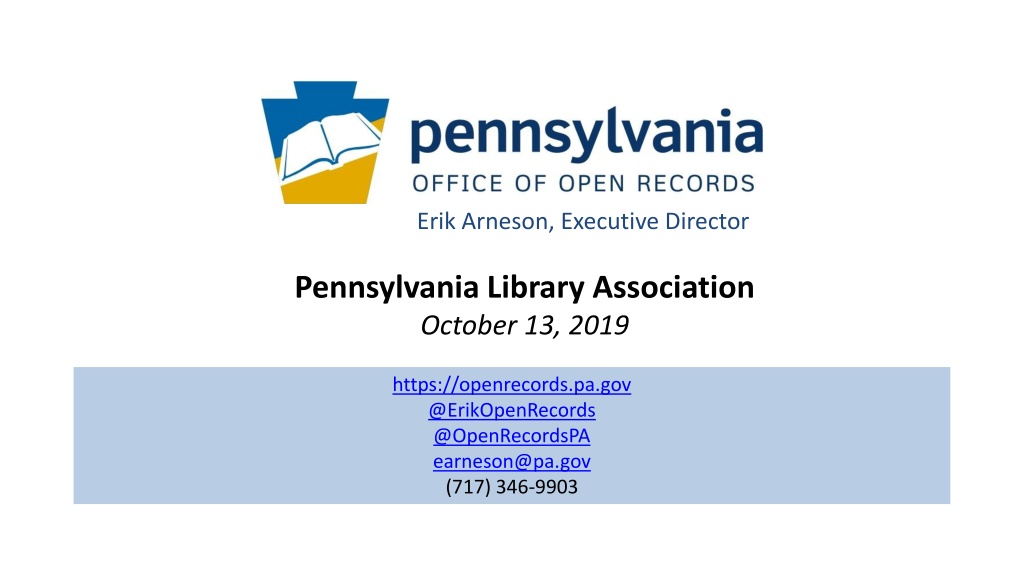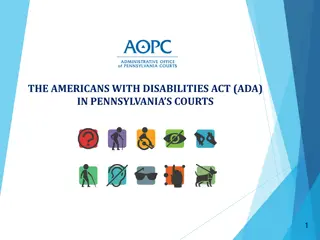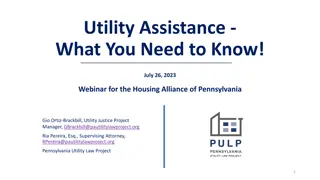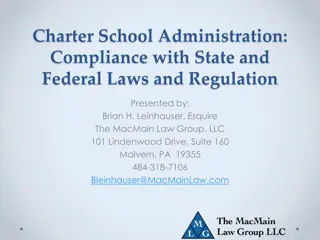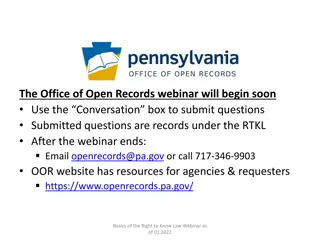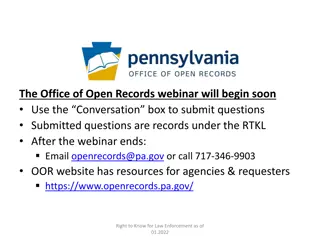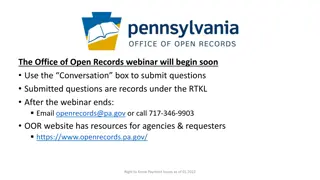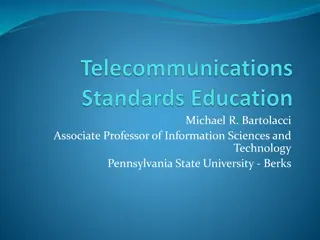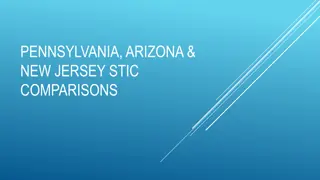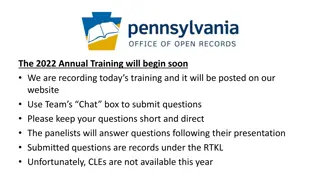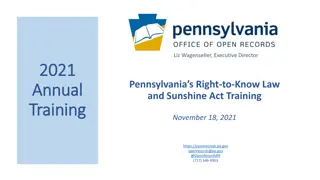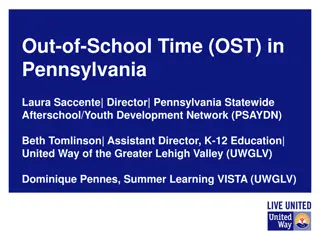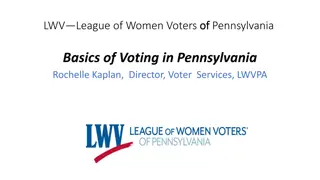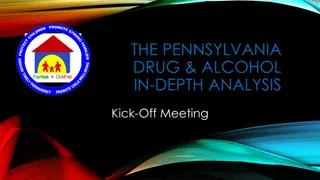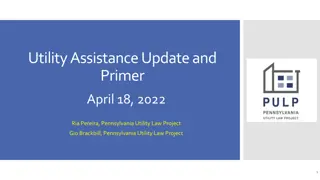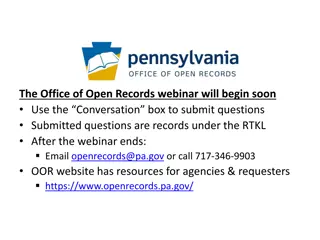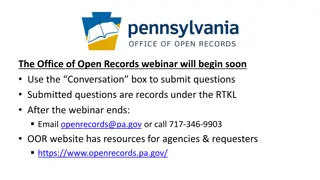Understanding the Pennsylvania Right-to-Know Law
The Pennsylvania Right-to-Know Law (RTKL) governs access to state and local government records. This law ensures transparency by allowing individuals to request and access records created or held by agencies. The process involves submitting a request, agency response, possible appeal to the Office of Open Records, and potential court involvement. Records can take various forms, and certain exceptions exist, such as financial records and attorney-client privilege.
Download Presentation

Please find below an Image/Link to download the presentation.
The content on the website is provided AS IS for your information and personal use only. It may not be sold, licensed, or shared on other websites without obtaining consent from the author. Download presentation by click this link. If you encounter any issues during the download, it is possible that the publisher has removed the file from their server.
E N D
Presentation Transcript
Erik Arneson, Executive Director Pennsylvania Library Association October 13, 2019 https://openrecords.pa.gov @ErikOpenRecords @OpenRecordsPA earneson@pa.gov (717) 346-9903
What is the Right-to-Know Law? The RTKL governs access to most state and local gov t records What is a record ? information, regardless of physical form or characteristics, that documents a transaction or activity of an agency and that is created, received or retained pursuant to law or in connection with a transaction, business or activity of the agency How do you get access to a record? Submit a RTKL request every agency MUST respond
Office of Open Records Created by RTKL: Independent & quasi-judicial Decide appeals filed by people denied access to records Provide RTKL & Sunshine Act training 20 total staff Executive Director & Deputy Director 13 Attorneys (incl. 11 Appeals Officers) Chief of Training & Outreach 4 Administrative
Right-to-Know Law Basics The basic RTKL process looks like this: Requester submits request to state or local agency Agency responds: grant, deny, or mix of both If request is denied (even in part), requester can appeal to OOR Free, no lawyer needed OOR issues a binding final determination Either side can appeal to court (happens <10% of the time) Court of Common Pleas for local agencies Commonwealth Court for state agencies
Records Take Many Shapes The Right-to-Know Law Doesn t distinguish between formats Paper, email, texts, social media, audio, video, etc. Doesn t distinguish between agency & personal devices Or between agency & personal email accounts Or between agency & personal social media accounts All that matters: Is it a record? And if so, is it a public record?
Right-to-Know Law Basics All state & local government records presumed to be public 30 exceptions in the RTKL Fewer apply to financial records & aggregated data Exceptions in other laws & regulations e.g., HIPAA, FERPA Attorney-client privilege & other privileges recognized in PA Records can be made non-public by court order When a denial is appealed, agency bears burden of proof
Right-to-Know Law Basics Examples of commonly requested public records Meeting minutes Agency budgets Invoices & Expenditures (e.g., road repaving costs, solicitor invoices) Settlement agreements Copies of required reports (e.g., Interscholastic Athletics Opportunity report) Aggregated (depersonalized) data
How to File a RTK Request Submit your RTK request to the correct agency Submit requests to the agency that has the record Rarely the OOR we receive >900 misdirected requests every year Address requests to Agency Open Records Officer (AORO) AORO database available on OOR website
More About Agency AOROs Many agencies, but not all, have a single AORO Commonwealth agencies: DEP, DCNR, DOC, DCED, etc. Some agencies have separate AOROs by bureau, dep t, etc. e.g., Philadelphia has approximately 40 AOROs Important to send request to the right AORO If not sure, say so: If this request is misdirected, please let me know so I can withdraw it and direct it to the proper AORO. 9
How to File a RTKL Request OOR Standard RTK Request Form, part 1 10
How to File a RTKL Request OOR Standard RTK Request Form, part 1 11
How to File a RTKL Request OOR Standard RTK Request Form, part 1 12
How to File a RTKL Request OOR Standard RTK Request Form, part 2 13
How to File a RTKL Request OOR Standard RTK Request Form, part 2 14
How to File a RTKL Request OOR Standard RTK Request Form, part 2 15
Timeline of a RTKL Response Every state & local agency must respond to RTK requests Must respond in writing within 5 (agency) business days If no response received, request is deemed denied Allow additional 3 business days for postal mail before filing appeal Agency can extend timeline by 30 calendar days Must be done in writing within the initial 5 business days Any other extension must be agreed to by requester & in writing Track all dates & deadlines in case you need to appeal
Agency Response: Costs & Format OOR fee schedule developed pursuant to RTKL No charge for electronic records Redactions may necessitate printing electronic records Up to $0.25/page for hard copies (8.5 x 11) Requesters can photograph records they asked to inspect Agencies do not have to create a record Agencies required to provide records in medium requested (electronic vs. hard copy)
Common Exemptions Raised by Agencies Exemptions raised most often during appeals to OOR in 2018 1. Noncriminal investigative, 708(b)(17) 2. Criminal investigative, 708(b)(16) 3. Internal, predecisional deliberations, 708(b)(10) 4. Personal identification information, 708(b)(6) 5. Public safety, 708(b)(2) & Personal security, 708(b)(1)
Requesting Police Recordings RTKL does not apply to police recordings Act 22 of 2017 covers police video & audio recordings Requests must be submitted within 60 days of recording date Requests must be submitted via certified mail or in person Agency has 30 days to respond, may deny for various reasons Denials may be appealed within 30 days to court; $125 fee Law enforcement agencies & DAs have fairly broad discretion to release a recording (with or without a written request) More info on OOR website
Tip: Communicate with the Agency Good communication can prevent and solve many issues Good practice to let agency know you re willing to talk Requesters often submit broad requests to ensure they get all the records they want Understandable, but can be expensive & frustrating Requesters don t want surprise bills Agencies don t want unnecessary work Many agencies willing to discuss requests If agreement reached on revised request, put it in writing
Appealing a RTKL Denial OOR appeal process designed to be simple File appeals using online form at OOR website About 10 to 15 minutes to fill out Only need to complete the form can make argument later No lawyer necessary OOR assigns Appeals Officer to oversee case Both sides can present evidence & argument OOR has 30 days to issue Final Determination
Tip: Consider Requesting Mediation RTKL authorizes OOR to establish informal mediation program Goal: Mutually agreeable settlement Voluntary & confidential Either side can end mediation at any time If mediation ends, case moves to normal appeal process (new AO) OOR has trained mediators Can save time & expense 22
OOR Caseload Thousands of RTK appeals filed every year In 2018, OOR heard 2,229 appeals Three-year average: 2,255; Five-year average: 2,341 That s appeals, not requests No central database of # of requests LBFC Study (released 2018) estimated 109,000 requests received by state & local agencies, combined, in 2016 Thus, approximately 2.1% of requests are appealed to OOR Our data indicates <10% of OOR decisions are appealed to court
OOR Resources Website, Twitter, Email Lists & More Web: https://openrecords.pa.gov/ Blog: https://openrecordspennsylvania.com/ Email lists: Daily Digest of FDs & General Updates https://www.openrecords.pa.gov/EmailSubscriptions.cfm Twitter: @OpenRecordsPA Executive Director: @ErikOpenRecords YouTube Channel Open Records in PA Podcast: Apple Podcasts, Stitcher, etc.
